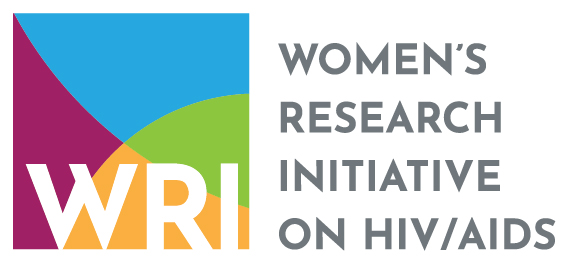The Women's Research Initiative on HIV/AIDS (WRI) is dedicated to elevating, enhancing, and expediting research on women and HIV. The 2014 WRI meeting focused on the role that violence and trauma play for women in HIV acquisition, access to care, care delivery, retention, and wellness outcomes. The WRI 2014 featured presentations by experts highlighting the most recent evidence on the impact of violence and trauma across the entire spectrum of women's experiences with HIV and examining successful strategies to address attendant challenges. Building on the WRI 2013 meeting, which broadly examined gaps in women's HIV care and treatment across the care continuum, the WRI 2014 examined one set of factors –violence and trauma—that may affect everything from acquisition of infection to viral suppression and overall health once infected.
As in past meetings, WRI 2014 brought together national HIV/AIDS thought leaders from diverse backgrounds, including clinical care, research, academia, advocacy, the government, the pharmaceutical industry and women living with HIV. This expert think tank operationalizes the transdisciplinary approach advocated by the WRI. By addressing issues that affect women through a variety of lenses, the WRI is able to expand understanding of effective treatment and prevention for women and girls living with or at risk for HIV.
- View the full 2014 WRI Issue Brief
- View photos from the 2014 WRI meeting on our Facebook page
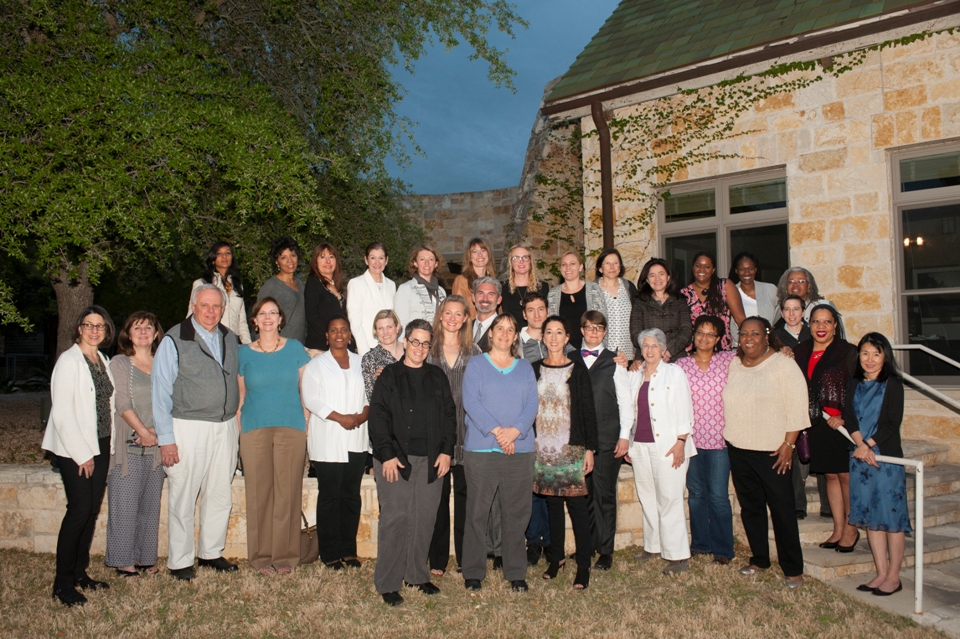
WRI 2014 Meeting Approach and Speaker Presentations
To highlight the most recent evidence on the impact of violence and trauma across the entire spectrum of women's experiences with HIV, invited speakers presented their work. These presentations examined the ways in which violence and trauma may affect everything from acquisition of infection to viral suppression and overall health once infected. These talks:
- Introduced trauma and violence across the continuum of HIV care among women: Kristin Dunkle, PhD, MPH, Emory University, laid the groundwork for the meeting, by defining the many ways that violence and trauma can be felt and perceived, as well as the challenges with those definitions. She provided background on the prevalence of violence and trauma and evidence linking them with HIV infection.
- Grounded the impact of trauma and violence in the real-life experience of HIV-positive women: Gina Brown, RSW, AIDS United, Rebecca Denison, long-time treatment advocate, and Naina Khanna, Positive Women's Network – U.S.A., shared their experiences both as positive women and working with positive women and addressed the following questions:
- What sources of violence and trauma are underreported or under-recognized?
- In your experience, how have individual healthcare workers (social workers, case workers, nurses, doctors) addressed trauma/violence? Has their approach helped or hurt?
- What do we know about resilience?
- Described knowledge base about physiological impact of trauma and violence on HIV acquisition: Charles Wira, PhD, Dartmouth College, described the impact of hormones on immune function in the female reproductive tract (FRT), the FRT's susceptibility to HIV infection, cervical maturation, the role of inflammation as a driver of HIV acquisition and transmission, and the perturbation of the vaginal environment by sexual intercourse. He also specifically addressed female genital mutilation, the impact of physical abuse on immune systems, and the relationship between forced sex and HIV risk.
- Described how trauma and violence affect clinical outcomes: Edward Machtinger, MD, University of California at San Francisco, highlighted the ways that violence and trauma may impact women along the HIV care continuum, affecting their ability to achieve optimal outcomes. He noted that despite clear links of trauma to poor health outcomes, existing evidence-based interventions, and national calls to action, guidance is lacking on the core components of a holistic and practical model of trauma-informed primary care.
- Addressed the psycho-social issues related to trauma and violence that affect the health and well-being of HIV-positive women and women at risk: Gail Wyatt, PhD, University of California at Los Angeles, described the ways in which racially discriminatory attitudes and practices can heighten the vulnerability of individuals to be sexually abused and/or exploited. She described the psychological impact of violence and trauma and provided recommendations for how to manage those effects.
- Delved into the continuum of care: Erika Aaron, MSN, CRNP, Drexel University, Lisa Fitzpatrick, MD, MPH, United Medical Center, and Linda Scruggs, Ribbon Consulting Group, described the impact of trauma and violence as well as strategies to address them at each step along the HIV continuum of care (testing, linkage to care, engagement in care, and adherence). Each panelist also answered the following questions:
- How do you address the inherent trauma of an HIV diagnosis and its impact on women?
- What strategies do you use to bring trauma-informed care?
- What do you see as knowledge gaps in trauma and violence among HIV-positive women?
- Highlighted policy implications for WRI 2014 findings: Vignetta Charles, PhD, AIDS United, Jen Kates, PhD, Kaiser Family Foundation, and Carole Treston, RN, MPH, Association of Nurses in AIDS Care, provided updates on the Affordable Care Act, Ryan White, and Medicaid Part D and shared opportunities within those policy frameworks to integrate trauma-informed care.
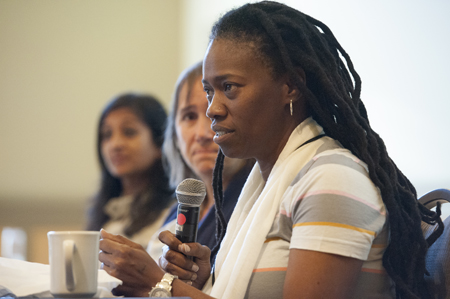
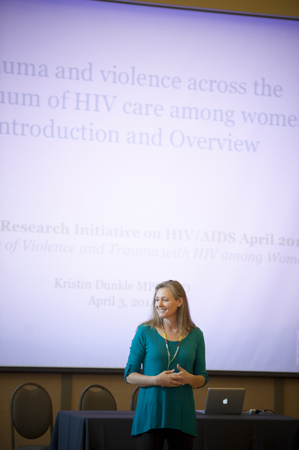
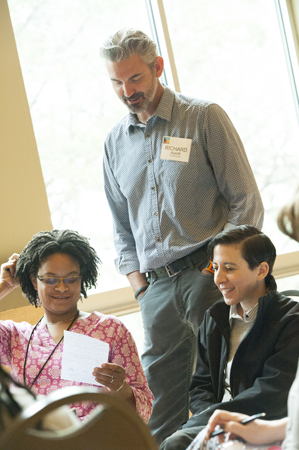
2014 WRI Meeting Participants
| Erika Aaron, MSN, CRNP (WRI member) Drexel University College of Medicine |
Adaora Adimora, MD UNC School of Medicine |
| Judith D. Auerbach, PhD* (WRI member) UCSF |
Dawn Averitt (WRI member) Averitt Consulting |
| Gina Brown, RSW (WRI member) AIDS United |
Gina Brown, MD (WRI member) NIH, Office of AIDS Research |
| Huyen Cao, MD Gilead Sciences, Inc. |
Vignetta Charles, PhD AIDS United |
| Elizabeth Connick, MD* (WRI member) University of Colorado Denver Anschutz Medical Campus |
Rebecca Denison WORLD |
| Dazon Dixon Diallo, MPH (WRI member) SisterLove, Inc. |
Kristin Dunkle, PhD, MPH Emory University |
| Erin Falvey Christie's Place |
Judith Feinberg, MD (WRI member) University of Cincinnati |
| Lisa Fitzpatrick, MD, MPH (WRI member) United Medical Center |
Rowena Johnston, PhD (WRI member) amfAR – The Foundation for AIDS Research |
| Jennifer Kates, PhD (WRI member) Kaiser Family Foundation |
Naina Khanna (WRI member) Positive Women's Network - USA |
| Randi Leavitt Merck & Co., Inc. |
Edward Machtinger, MD UCSF |
| Caroline Mitchell, MD, MPH (WRI member) University of Washington |
Tonia Poteat, PhD, PA-C* (WRI member) Office of the U.S. Global AIDS Coordinator |
| Maura Riordan (WRI member) AIDS United |
Linda H. Scruggs (WRI member) Ribbon Consulting Group |
| Carole Treston, RN, MPH Association of Nurses in AIDS Care |
Fulvia Veronese, PhD (WRI member) DAIDS, NIAID, NIH |
| Angelina Villasis Keever Bristol-Myers Squibb |
Charles Wira, PhD (WRI member) Geisel School of Medicine at Dartmouth |
| Gail Wyatt, PhD (speaker) UCLA |
Carmen D. Zorrilla, MD (WRI member) UPR School of Medicine, Maternal-Infant Studies Center |


